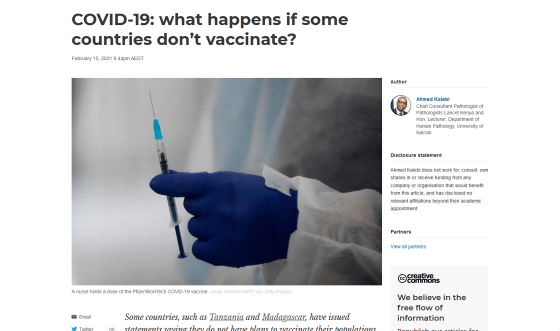What if some countries don't get the new corona vaccine?

Vaccination of the new corona virus (SARS-CoV-2) is underway around the world, but in Tanzania, President John Magufuli said that
COVID-19: what happens if some countries don't vaccinate?
https://theconversation.com/covid-19-what-happens-if-some-countries-dont-vaccinate-155144

In countries where the majority of the population is unvaccinated, the risk of SARS-CoV-2 spreading in the community over the long term is likely to increase. According to Dr. Kalebi, the longer the SARS-CoV-2 infection in the community, the more likely it is that the virus will mutate, making it more infectious and lethal. It can be a breeding ground for 'strains'.
The SARS-CoV-2 vaccine is created based on the genetic information of the spike protein on the surface of the virus, and immunity is acquired by producing an antibody that reacts with the spike protein in the body of the inoculated person. However, Dr. Kalebi points out that when the virus mutates, the genetic information of peaplomers changes, and there is a risk that existing vaccines will not be able to obtain immunity.
Therefore, even if vaccination is performed in most countries, if the country that has not been vaccinated becomes the 'breeding ground for SARS-CoV-2 mutant strains', the vaccine will be effective in other countries as well. There is a risk of spreading no mutant strain. If this happens, even those who have already been vaccinated or who have been infected with SARS-CoV-2 in the past may be infected with mutant strains with different genetic information.
It is virtually impossible to completely isolate an unvaccinated country from the world, so if even one country does not vaccinate, most of the population will continue to be at risk. You will be exposed. Dr. Kalebi argued that everyone in the world needs to be properly vaccinated because it is difficult to control SARS-CoV-2 infection with existing public health measures alone.

Vaccination is the most effective and controllable way to contain SARS-CoV-2 infection, so governments need to deploy vaccination to their own people quickly. In addition, to prevent the spread of infection before the vaccine deployment is completed, we will thoroughly implement public health measures such as wearing masks, washing hands, and increasing social distance within the community, and reduce the risk of developing mutant strains and the death of COVID-19. It is also important to keep it to a minimum.
Furthermore, according to Dr. Kalebi, it is important to enhance PCR tests and antibody tests to monitor the infection rate of SARS-CoV-2 and the spread of mutant strains, and to prioritize vaccine distribution. Dr. Kalebi argues that authorities should take local urban blockades and quarantine measures if there are signs of an outbreak in some areas.
Governments need to consider not only their own country but also other countries, as the completion of SARS-CoV-2 vaccination by people around the world will lead to their own security. 'Developed countries should work together to fund vaccine production and global supply, and support the development of vaccine production bases in developing countries,' said Dr. Kalebi. ..

Related Posts:
in Note, Posted by log1h_ik







